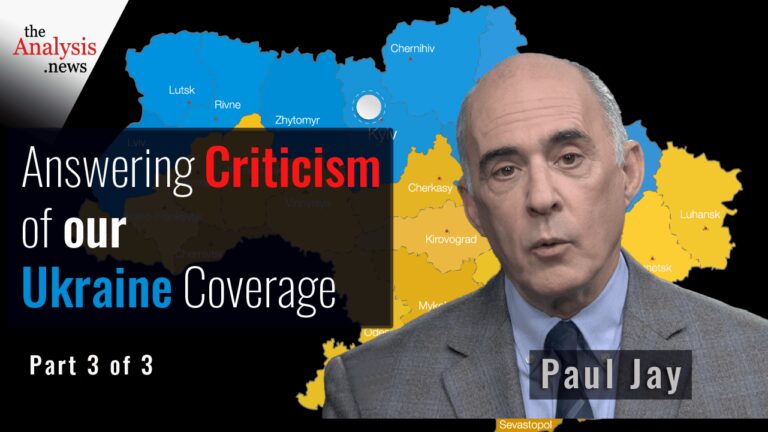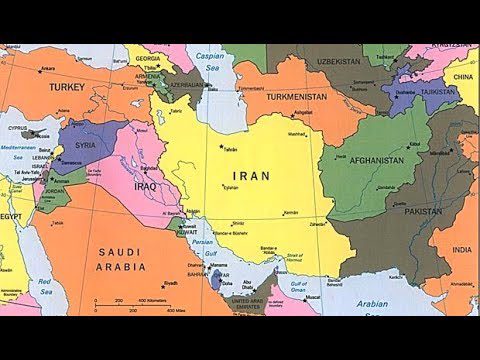Colonel Lawrence Wilkerson, who was a special assistant to a Chairman of the Joint Chiefs, comments on Milley‘s phone call to China, the nuclear submarine sale to Australia, and the danger of a single man, the president, having the ability to launch a nuclear strike and end life on earth.
TRANSCRIPT
Paul Jay
Hi. Welcome to theAnalysis.news. I’m Paul Jay. As you can see, I’m on location. I’ve just spent a week interviewing Daniel Ellsberg for an upcoming documentary on his book Doomsday Machine. And that’s an appropriate thing to be talking about his Doomsday Machine, as the Chairman of the Joint Chiefs of Staff felt it necessary to call his counterpart in China in order to warn him. That sounds like that if you think Trump is mad, he probably is. But don’t worry, it’s not dangerous. We’re not going to attack you. In the context of this increasingly tense Cold War and increasing talk of nuclear weapons, it’s all a rather terrifying proposition. We’ll be back in a few seconds with Larry Wilkerson.
So now joining me is Col. Larry Wilkerson, who was the Chief of Staff to Colin Powell when he was Secretary of State. He was also Special Assistant to Colin Powell when he was the Chairman of Joint Chiefs. So Larry has had a real inside view of how the Joint Chief operates. And so I’ll go right to Larry. So thanks for joining me, Larry.
Col. Lawrence Wilkerson
Good to be with you, Paul. Even if you are in Southern California.
Paul Jay
So [Mark] Milley apparently is concerned. What we know about the context from various books and reports that have come out; that Milley believes that not only is [Donald] Trump deranged, mentally deteriorating but that there’s a right-wing coup in progress. This is leading up to the events on Capitol Hill on January 6th. Apparently, he has a real fear that Trump might start something with China, but at the very least, he seems to get intelligence that the Chinese think Trump is about to start something with China. He calls his Chinese vis-a-vis to calm things down.
So what’s your take on this? I mean, there’s a big debate about whether it was appropriate to make such a call in terms of the chain of command and his duty to report to the President? Although I think, the bigger question is: how dangerous is the situation with China? But maybe start with the first one.
Col. Lawrence Wilkerson
It’s an interesting set of circumstances. Let me say right from the start, I don’t know that any of the reporting is accurate or accurate to the extent that one could make these kinds of value judgments.
Andrew Bacevich, for example, has written a piece — I just read it. Milley should go. Several others have to, and then others have defended him. I wouldn’t go that far because I don’t know. I wasn’t there. I didn’t hear the telephone calls if they indeed took place, and so forth. Let’s just speculate for a moment that the reporting, such as it is, and I know Bob Woodward’s reporting and know that it is often grossly inaccurate. I don’t know about these other people, but let’s just surmise for a moment that it’s fairly accurate and look at it from the perspective that you just described.
First of all, if he did call the leaders of China, then he had to be deeply, deeply concerned that this President, Trump, was mentally unstable. And maybe even worse. Maybe that mental instability led to others influencing him to do things that Milley thought would be severely damaging to the country.
So if that’s the case, I personally don’t have a problem with Milley doing what he thought at the time with circumspect in order to do everything you could to preclude any of that result. I do have a problem with a civil-military relationship, but I don’t know how — and breaching it as it were, but I don’t know how we judge, evaluate, sanctimoniously pontificate about that when we don’t know the exact circumstances. We do know one thing, Paul. We know that Donald Trump was a moron. We know that he was a mafia-like moron. We know that he had incited people to where they would do something like January 6th.
Looking at it from Milley’s perspective, after he had been trapped into that promenade at Lafayettes Square in St. John’s Church. Looking at it from that perspective, I would have to worst case it. You’re already as a military officer, going to worst case, it just by habit, but I definitely would with Donald Trump. I would worst-case Donald Trump all the way to the graveyard because that’s the only way you could possibly survive. Indeed, that may be the way the nation survived, as you more or less indicated in the run-up.
So I’m not one to take Milley to task for doing something that, at the moment, and in the grave circumstances that surrounded him, he thought was circumspect and right, and indeed might have prevented a nuclear exchange. You and I both know how dangerous that is, and we both know how easy it is to do.
Paul Jay
There’s been another reporting which I haven’t seen repeated in the recent conversation about Milley, but apparently, Trump was seriously trying to instigate an attack on Iran and was either talked out of it, or the military didn’t want to go along with it. He was — the idea of a kind of wag the dog event seemed to be under very serious conversation in the White House.
Col. Lawrence Wilkerson
I think it probably was, and I think it was from the perspective of Donald Trump. This is my own view now. I have no proof of this, but from my reading of Donald Trump, that was not big enough. It would have had to be something bigger to really wag the dog that he wanted to wag. I think his preoccupation from the time that he realized, whenever that was, I suspect it was even earlier than the final returns; that he had lost and was in his mind convinced he didn’t lose or doing that politically anyway. He forgot about leading. If he ever knew anything about it. He absolutely neglected the government from that point on and focused entirely on restoring himself to the presidency for another term. Whether it was by revoking the vote or whether it was by storming the capital, he was intent on doing that.
In that absence, of any focus at all by the principal leader, indeed, the person who decides on use of nuclear weapons, as lamentable as that state of decision making is, I still can’t bring myself to believe that the American people support the President of the United States; that the Congress of the United States supports the President of the United States having exclusive authority to use nuclear weapons.
In that situation, I go back to my original comment. Milley was right in doing what he did, based on my reading of the situation. As I said, I don’t know everything.
Paul Jay
Now me sitting, reading the news, and watching what was in the public domain, I came to the conclusion very early that a coup was in progress prior to January 6th: the public letter on January 4th, and the 10 former Secretaries of Defense, you have, Admiral [James G.] Stavridis supporting that letter, saying that the acting Secretary Defense doesn’t have the backbone to stand up to this President. I got a feeling the Chinese know more than I do. I mean, they must have enormous resources aimed at trying to understand what the hell is going on in the U.S. government, and it might be coming at them.
Col. Lawrence Wilkerson
Precisely, and I will almost guarantee you that they were seriously concerned, if not scared.
Paul Jay
I mean, if Milley’s concerned, [Gina] Haspel from the CIA’s concerned, and these Secretaries of Defense are concerned — and I have to add on January 4th of the same day as that letter from the former Secretary — just to remind everybody, because I seem to be the only one that keeps repeating this. The Financial Times had an editorial that said, A Coup is in Progress. So the Chinese are looking at a Coup is in Progress. All these official sources are saying there’s crazy right-wing, white-wingers, and I think it’s not as simple as crazy right-wingers.
I think it’s very important if I understand what’s been going on; it’s a section of the military that’s really controlled by Christian nationalists and maybe far-right Catholics like Opus Dei. A lot of crazy, fascistic kind of forces were behind all of this. The Chinese are looking at this and get, perhaps, some other intelligence that Trump actually has some serious wag the dog ambitions. I mean, it’s no doubt Milley thought the Chinese might take all this very seriously.
Col. Lawrence Wilkerson
I’m sure they were in Beijing and also in Tehran. Let me just reinforce what you said there. On February 6th, as I recall, Secretary of Defense Lloyd Austin issued a directive to all the services. He told them to take a full day, stand down for a full day, at their convenience but do it quickly, and examine this question of extremism. I think it even said he wanted to report back in a certain amount of time, which was very short. Not a thing has been said, not that we can see publicly anyway. Not a word has been said back about this examination of extremism in the ranks of the armed forces.
I’m sure that was all Milley’s mind too. There’s no way the Chairman or any service chief for that matter, particularly this group of people, know what the real percentage of these people in the ranks is. Even those amongst the Officer Corps. So maybe it’s small. Maybe it’s minuscule. Maybe we’re making mountains out of molehills, but I don’t think so. I think it’s rather significant. I would surmise in the elicited ranks it might be as many as a third, and then the Officer Ranks, you don’t need too many to lead that one-third.
So that had to be on Milley’s mind too. The concern that maybe he didn’t control his subordinate commanders, who are really the commanders, didn’t control the entire U.S. military. What did that mean? What does that mean on January 6th? What did it mean in general, with regard to Trump taking back his presidency as it were?
Paul Jay
Admiral Stavridis, who I just mentioned, who wrote this article in Time Magazine supporting the 10 secretaries letter. He had another article a couple of weeks later, which essentially called for purging the armed forces of this extremism, that there’d been no attention paid in recruitment.
Col. Lawrence Wilkerson
How can you do that, though, when you can’t recruit sufficient numbers for the all-volunteer force? When you’ve had to go to women, to the extent that they have, and are still going to women, to the extent that they are, in order to make up for the men you can’t find. When you have to take mental category force. When you have to excuse drug use, something we said we’d never do again. That’s what they’re doing now. When you have to put 9,000 non-commissioned officers out to be recruiters, damaging their careers in the long run, then offer them a bonus when they recruit well so that they’ll stay another year or two in that job.
That’s a brigade, Paul. That’s a brigade of NCOs. You’ve got a combat brigade of NCOs. That’s what they’re having to do to recruit. If you say that you have a problem with extremism or with Christian nationalism, which is almost the same thing, then you’re saying lots of young men and women who might have a predilection to come into the services aren’t going to because you’re making it inhospitable for them. So they’re hoisted on their own petard here. They don’t know which way to turn. When I say they, those leaders who care about their services, they don’t know which way to turn.
Paul Jay
And I think they’re afraid to have the force of this Christian nationalism. They have a lot of clout, not just in the military but obviously electorally.
Col. Lawrence Wilkerson
And the President of the United States has National Prayer Breakfasts and invites Billy Graham, before he passed away, to come in and orchestrate a country whose Constitution says you’re not supposed to be here, Mr. Graham.
Paul Jay
Right. I have an interview up on the website now with Daniel Ellsberg about these events. He tells the story of what happened in 1983, when [Yuri] Andropov, then Prime Minister of the Soviet Union, thought that [Ronald] Reagan was planning a first strike and was getting ready for a preemptive strike, was on the edge of a preemptive strike.
To think that the Chinese aren’t having to think about this, that if you got a crazy President and he can’t be restrained, you can’t allow the first strike to come because the Chinese don’t even have that much of a second strike. They have some but nothing compared to what Russia and the United States have.
Col. Lawrence Wilkerson
We are now incentivizing them. I think the Central Party School and the strategy think tank of China has already made this decision to build furiously so that they get to the point where they have a first strike ride-out capability and a second strike retaliatory capability. That means lots more nuclear weapons. That means going from 300 to 600, as in their arsenal right now, to somewhere around what we and the Russians have, around 4,000. That’s a horrible thing for us to incentivize.
Paul Jay
It’s insane.
Col. Lawrence Wilkerson
It is.
Paul Jay
The only logic you can make out of this, certainly the conclusion Ellsberg comes to; this has nothing to do with strategic defence.
Col. Lawrence Wilkerson
No.
Paul Jay
This build-up is about how much money gets made building this stuff.
Col. Lawrence Wilkerson
That’s right. That’s right. It’s all for the complex that is significant, but niche. The nuclear weapons complex is just as politically powerful as the rest of the complex.
Paul Jay
When you look into who owns the 12 companies who primarily make American nuclear weapons, they’re primarily owned by the same financial institutions, then all of the rest of the military-industrial complex, and most of the media, and on, and on.
Col. Lawrence Wilkerson
You look at the one that handles things like Hanford in Washington, where there are accidents that outstrip Chernobyl, in their potential, waiting to happen. It’s Bechtel. And Bechtel, that famous fort builder from Iraq and Afghanistan, forts that nobody wouldn’t demand, is all-powerful there and linked up with not just DOE, Department of Energy, but Department of Justice and Department of Defense. So that whistleblowers, like nuclear physicists, who want to blow a whistle now and then can be taken care of most efficiently because you got justice in your pocket and you got energy in your pocket.
Paul Jay
So I said before the interview we were going to talk about this in a separate interview, but I think it’s kind of natural to go to it now. So what do you make of this submarine deal with Australia? On the face of it, it just makes no sense. It’s not like Australia can do much of anything with it. It doesn’t — it’s just a provocation, it seems, and a money-making operation. What the hell are Australians going to do with it?
Col. Lawrence Wilkerson
If I’m looking at this from Beijing’s point of view — you know, the last flight I made, Paul, with Richard Haass and the policy planning team was from Sydney. We were supposed to go to Canberra for policy planning talks with the Australians, but Canberra was off-limits for some reason. I can’t remember why. So we had them in Sydney, and then we flew straight to Hong Kong. I had a good chance to think about — as I looked at the map as we flew up, the strategic geography of the South China Sea and the vulnerability of the Southern rim of China.
So when you look at it from the Chinese perspective, nuclear submarines coming out of Perth, for example, that’s scary. That’s scary for you because you’re almost in a position where now, if not in a position where now you are the hegemon in the South China Sea, from a naval and air perspective.
In other words, anybody else contesting that has to fight their way in, and they’re fighting on exterior lines. You’re fighting on interior lines. Submarines change that equation with each platform; whether they’re attack submarines or ballistic missile submarines, they change that equation because you suddenly now have eight if the deal goes through for eight. Nuclear submarines don’t have to surface, can stay under for extended periods of time, are heavenly weaponized in your lake. They can do all kinds of things.
In the attack submarines, the Astute class, for example, what the British have, and it probably will be the bulk of the submarines that Australia gets. They’re submarine killers. They go after your submarines in the South China Sea. I’d be really worried if I were China, and that brings me to my major point. This is the day, the initiation of the second Cold War.
Patrick Lawrence had a piece in Consortiumnews. I recommend it to you. Very good piece. He puts it down. This is the beginning of the second Cold War, and at the end of this Cold war, the empire will be gone.
Paul Jay
Well, at the end of this Cold War, we could all be gone.
Col. Lawrence Wilkerson
Yes, that’s not his implication, I don’t think. But it certainly is a possibility. It’s a potentiality.
Paul Jay
The thing I don’t get about this if you get to the point that submarines are targeting submarines, and the Chinese are trying to take out the Australian submarines, and the Australian submarines are taking out the — if you get to that level of conventional war, there’s just no way. I think, and from what I understand, that’s going to stay conventional because one side, it’s going to start to lose, but I guess there could be a stalemate.
Col. Lawrence Wilkerson
It’s not really conventional, even in the sense you just said, strictly speaking, because some of those are boomers. Some of those are ballistic missile submarines. So you lose this ballistic missile submarine; you’re going to do what you need to do before you lose it. You’re certainly going to do what you think you need to do after you lose it. And that’s probably go nuclear.
Paul Jay
I think what makes people think that could never happen is they just can’t imagine how any rational General or politician would order nuclear, when everyone who knows anything about this, that it’s essentially the end of organized human life and probably all human life. How do you order it?
I’m learning from Ellsberg, and he showed me this document. One of the — this documents been reported on, that is probably still classified top secret, but he showed me this. The logic in 1958 was in a fight over Taiwan; that Eisenhower had said, if you can’t win this conventionally, you’re authorized to win this fight with the Chinese over Taiwan with nuclear.
Now it turned out the Chinese decided not to push it. If you can imagine the tensions over Taiwan, and if it gets to that level, do you think the logic from 1958 remains? Which is we’d rather fight nuclear than lose a conventional fight over Taiwan.
Col. Lawrence Wilkerson
I think not in the general sense, because of what you’ve just implied; that we all have had a lot of history now. Escalation history, escalation study the kinds of things, for example, that Rich [Armitage] and Colin pointed out to the Indians and the Pakistanis back in 2002, when they were thinking about firing nukes at one another. That’s a residue that’s still with us, I think. But your point is well taken from the perspective of the way the military in particular, in both Russia and the United States, are talking again like they did in the ’50s about the utility of battlefield nuclear weapons and the concomitant rationale that you can ride it out if it’s small if there aren’t too many of them.
Well, that neglects what I just spoke of, the escalation theory that we really laboured to produce over the fifties, sixties, and seventies; that says you can’t do that. You simply can’t do that. It just doesn’t work that way. And by the way, that’s what Colin and Rich told the Indians and the Pakistanis in 2002, too. You can’t fire 20 and expect them to fire 20 back, or maybe 30 back and then you fire 40. You’re going to unleash your arsenals, and it’s going to be everything, and there are going to be flames from one end of the country to the other. And by the way, you’re going to flame us in Colorado, flame people on the steps of Russia, and everything else because you’re going to prevent them from ever growing another crop, or at least for a long period of time, nuclear winter and all that other business that we know more about now.
So yes, you’re right in the sense that residual information is still there, but I think we’re forgetting it. Every day that goes by, we are getting closer and closer to being that person [George] Santayana talked about; the only thing you learn from history is that you learn nothing from history or that you forget it.
Paul Jay
Given all of this and given [Joe] Biden talking about the need for cooperation with China on climate, which is clearly the overriding issue facing humanity, other than the threat of nuclear war. Why the hell do the submarine deal now?
Col. Lawrence Wilkerson
That was the Consortiumnews article’s point. It just makes no sense unless you are — if you’re just utterly committed to the template, that the only way the complex, your political power is insured is through another Cold War; that’s the only rationale you can come up with. I agree with it. I agree with it. That’s the only rationale you can put on this deal; it makes no sense. It makes no sense at all unless you are utterly intent on a second Cold War and going back to those conditions that pertain during the first Cold War, which were highly lucrative for politicians, pundits, journalists, and for the complex.
Paul Jay
Well, maybe that is the banality of it.
Col. Lawrence Wilkerson
It is.
Paul Jay
It is about the bloody money. It’s not even as much about the geo-politics. It’s about the billions and billions of dollars in this contract.
Col. Lawrence Wilkerson
Who was it? The philosopher? I forget him now. Was it [Friedrich] Nietzsche? Someone said the banality of evil is its most compelling aspect, and that’s what we’re talking about.
Paul Jay
One of the things that I think gets overlooked in terms of its significance when people look at the Iraq war and the events of 9/11 that led up to it; that $7 billion contract, no-bid contract that Halliburton got a few days before the invasion, that clearly [Dick] Cheney profited from. It’s a major factor, and of course, they thought they were going to get a big piece of the Iraqi oil industry, and so on.
Col. Lawrence Wilkerson
How can you have stock in Halliburton and have Halliburton make off the two theatres of war, Iraq and Afghanistan, $40 billion and not profit?
Someone told me the other day. I think it was Lindsay Koshgarian, one of the people that was preparatory for the On Point interview I did on Monday, that the share price increase for the major defense contractors throughout Afghanistan and Iraq was over 12,000%. When war is that profitable for that many powerful people, stand by, you’re going to have more of it.
Paul Jay
There was a Canadian doctor named [Norman] Bethune, who’s very famous in Canada, and also very famous in Spain and China. He wound up helping create the People’s Liberation Army Medical Service during the fight against Japan. He wrote this piece, and he talked about gentle gunmen who present themselves as gentlemen, stewards of society, and whose hands are dripping with blood because they’re just really focused on the money-making out of war. It really gets underestimated how much that drives all of this because there just is no other logic to this submarine thing.
I’m learning from Ellsberg and from you, there’s no logic to the number of ICBMs [Intercontinental ballistic missile]. There’s no logic to the whole nuclear war strategy other than money, primarily money-making.
Col. Lawrence Wilkerson
Yup. It’s. It’s hard to look at it any other way. It really is. This is starkly so, and Boris Johnson and Biden couldn’t remember the man down under. They are a trio for all time. I mean, I’m with [Emmanuel] Macron on this. The French have not always been the most stalwart allies in the world, but I understand their angst. Their angst is largely monetary too. What was it, an $80 billion deal or something like that?
Paul Jay
I think it was $60 billion. It probably means 100 by the time it’s done.
Col. Lawrence Wilkerson
By the time it’s done, especially with submarines, because building them is such a long, drawn-out process.
Paul Jay
Thanks very much for joining me, Larry.
Col. Lawrence Wilkerson
Thanks for having me, Paul and enjoy Southern California.
Paul Jay
Thank you. I’m going to end this piece with — we’re going to play a little thing from an Australian television called show called, I’m not sure if it’s still running, it’s called Utopia. They had a very funny skit they did about Australian generals figuring out how to increase the Australian military budget. It starts with, well, we need a big enemy. Obviously, it’s China. Anyway, I’m gonna play this now, but it’s funny.
Col. Lawrence Wilkerson
I know you’ve seen those two girls—the Australian’s who go after the Prime Minister.
Paul Jay
Oh yeah, they’re hilarious. Yeah, we play them all the time.
Col. Lawrence Wilkerson
Yeah, they’re hilarious.
Paul Jay
Yeah, I’m waiting for them to do one on this. But anyway, here’s this piece from Utopia, and it will make you laugh. Obviously, don’t forget the chilling backdrop as we’re laughing at it. Thanks very much, Larry.
Col. Lawrence Wilkerson
Thank you.
Paul Jay
Thank you for joining me on theAnalysis.news. Please don’t forget; we only keep going if you donate. So you got to go to the website, click the donate button, and please hit subscribe if you’re on YouTube. Most importantly, get on the email list, so you know when the stories are coming out. Thanks again.
CLIP
“Thanks, everyone, for coming and at such short notice. I thought the best way to proceed was to get everyone in the one room.”
“Good, thank you.”
“Okay. Alright.”
“I’ll come straight to the point. This white paper is recommending we spend close to $400 billion over the forward estimates. At some point, the Prime Minister is going to be asked a very simple question. In order to protect us from which enemy?
“It’s so hard to say.”
“$400 billion, pick one.”
“A regional player.”
“Specifically, Colonel.”
“An Indo-Pacific regional player.”
“More specifically.”
“Indo-Asia-Pacific.”
“That’s broader. Who are you leaving out?”
“Europe?”
“Yeah, so I sort of need a country.”
“Or an unaligned player?”
“No a country.”
“One that won’t threaten us, just one.”
“Yeah, I wouldn’t want to raise tensions.”
“Where.”
“In this room.”
“You know what? I’ll name one, and you just nod. China. Yeah, okay. And what exactly are we protecting?”
“Strategic interests.”
“Specifically, Colonel”
“Indo-Pacific strategic interests.”
“Really specific.”
“Indo-Asia-Pacific strategic interests.”
“You know what I’ll say it, and then you nod. Our trade roots. And who is our number one trading partner?”
“Shall we use the nod system?”
“Sure. China. Yeah. So under this scenario, we’re spending close to $30 billion a year to protect our trade with China from China. So that doesn’t strike anyone at this table as odd.”
END







More of Jays Obsession with the so-called coup that NEVER HAPPENED and only existed in the minds of anti-trump extremists connecting dots that didn´t exist. Also, all the hand-wringing about the extremists in the Army – where has that problem gone? No longer a problem with Trump gone I guess. To witness the complete loss of the objectivity that used to characterize this site is sad.
THERE certainly does exist one surefire option to cut off the ugly head of “strictly for Profit” Cold War nuke/arms escalation that Col. Lawrence Wilkerson and Paul agree likely started “again” with the profit motivated “Anglo-American U Boat Affair minus France”. And THAT answer has already begun to be suggssted seriously by European & Asian economic diplomacy that aims to DE-DOLLARIZE to such an extent that “Dollar no longer be King”. The dethroned Dollar scuttles arms complex ability to carry on its plan for a new “Cold War for Profit”. Living on credit might end sooner for the arms complex than later. But at least we’ll sleep a little better knowing that when the Dollar no longer can be King, peace and arms De-Escalation can be possible.